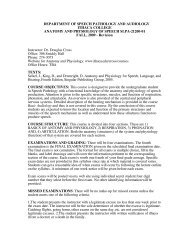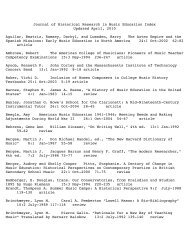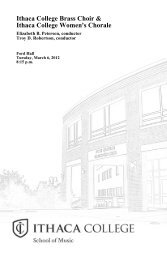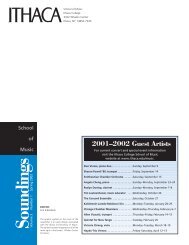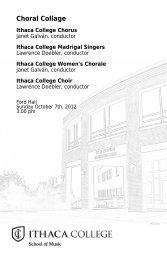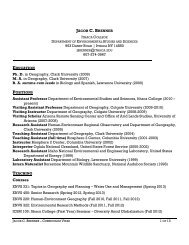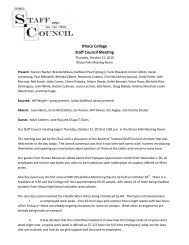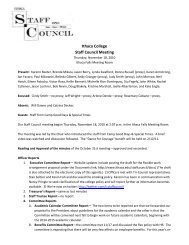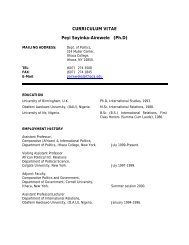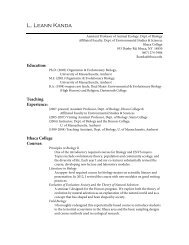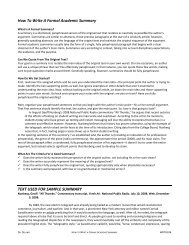A Brief Defense of Empiricism - Ithaca College
A Brief Defense of Empiricism - Ithaca College
A Brief Defense of Empiricism - Ithaca College
Create successful ePaper yourself
Turn your PDF publications into a flip-book with our unique Google optimized e-Paper software.
A <strong>Defense</strong> <strong>of</strong> “Naïve” <strong>Empiricism</strong> page 13 <strong>of</strong> 14<br />
Soames, S. (2003). “The Rise and Fall <strong>of</strong> the Empiricist Criterion <strong>of</strong> Meaning”<br />
(Chapter 13, Philosophical Analysis in the Twentieth Century vol. 1 The Dawn <strong>of</strong><br />
Analysis, Princeton: Princeton University Press)<br />
Strawson, P. (1963). Individuals: An Essay in Descriptive Metaphysics. (New<br />
York: Doubleday & Co. Originally published 1959.)<br />
van Fraassen, B. (1995). Against naturalized epistemology. (In P. Leonardi & M.<br />
Santambrogio (Eds.), On Quine: New Essays (pp. 68-88). Cambridge: Cambridge<br />
University Press)<br />
van Fraassen, B. (2002). The Empirical Stance. (New Haven: Yale Univ. Press)<br />
van Fraassen, B. (2007). From a view <strong>of</strong> science to a new empiricism. (In B. Monton<br />
(Ed.), Images <strong>of</strong> <strong>Empiricism</strong>: Essays on Science and Stances, with a Reply from Bas<br />
C. van Fraassen (pp. 337-383). Oxford: Oxford University Press<br />
Wittgenstein, L. (1953). Philosophical Investigations. New York: The Macmillan<br />
Company.<br />
Notes<br />
1 See Soames (2003) for a thorough discussion <strong>of</strong> the development and demise <strong>of</strong> the verifiability<br />
criterion <strong>of</strong> meaningfulness.<br />
2 And as Ayer and Hempel were to suggest about the verifiability criterion.<br />
3 I think this reply is implicit in the work <strong>of</strong> Quine (see especially 1969), but Quine does not explicitly<br />
reply to these objections. Also see Benjamin (1941) for a defense <strong>of</strong> empiricism against Russell‟s selfrefuting<br />
charge.<br />
4 Van Fraassen himself (1995, p69) <strong>of</strong>fers a detailed and accurate explication <strong>of</strong> the fundamental<br />
principle <strong>of</strong> empiricism. His elaboration is very helpful in relieving the obscurities and vaguenesses in<br />
the principle. Rather than indulge in such an explication here, I refer the interested reader to van<br />
Fraassen. Of course, van Fraassen finds the principle, even thus elaborated, to be objectionable.<br />
5 For a helpful analysis <strong>of</strong> analytic knowledge, see Boghossian (1996). Boghossian <strong>of</strong>fers an<br />
explanation <strong>of</strong> analytic knowledge in terms <strong>of</strong> what he calls “Frege-analyticity” and implicit definition<br />
that is not at odds with empiricism.<br />
6 The Hempelian fundamental principle <strong>of</strong> empiricism does not entail that experience cannot account for<br />
our knowledge <strong>of</strong> logic, mathematics, and formal propositions—it merely sets those aside.<br />
Furthermore, classical rationalists themselves sensed the need to provide a priori substantive<br />
propositions in order to establish their epistemology. That is one <strong>of</strong> the reasons that the ontological<br />
argument got such attention and support from Descartes, Leibniz, and Spinoza, and later rationalists<br />
and their opponents.<br />
7 How and why sensory perception can be evidence or supply evidence is itself a difficult and<br />
contentious issue. See in particular Gupta (2006) for a recent book-length discussion <strong>of</strong> this issue and a<br />
proposed solution. See also Christopher Peacocke‟s reply to Gupta (no date). Note that in defining<br />
“based on experience” I am diverging from classical empiricism, because I am not restricting<br />
experience to the individual‟s own personal experience. Contemporary empiricists should adopt a<br />
more Quinen view <strong>of</strong> experience where it is social and intersubjective. I discuss this issue in a bit more<br />
detail below.<br />
8 Here and in the following by “knowledge” and the like I mean knowledge <strong>of</strong> propositions other than<br />
those <strong>of</strong> logic, mathematics, and formal ones such as those mentioned above.<br />
9 Tim Crane (2003, p506) makes precisely this point in his review <strong>of</strong> BonJour (1998).<br />
An apparent advantage <strong>of</strong> the moderate empiricist picture as I have described it is that (like the<br />
foundationalist about empirical knowledge) it tries to tell a story about the structures or<br />
mechanisms by which we are justified in believing things. The appeal to rational insight, by



